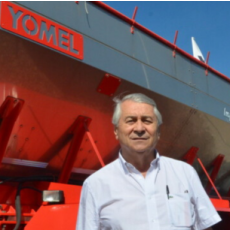What is GDM’s perspective on the future of Argentine agriculture, especially in light of recent government changes?
GDM was founded in Argentina but today, nearly 85% of its business is outside of the country, primarily in Brazil and the United States. One of the challenges in Argentina has been economic factors such as export tariffs, currency controls, and intellectual property protections, which have hindered growth in our industry. However, the company sees the new government’s emphasis on private property and intellectual property rights as a positive shift for the agricultural sector. With the removal of currency controls and potential tax cuts, GDM anticipates a more predictable market that will encourage greater investment in technology and allow their business, which operates on royalties from technology use, to expand given the potential increase in market size. A more favorable economic environment could enable Argentine producers to adopt new technologies, improving productivity and ultimately benefiting GDM’s operations.
In Argentina, the agriculture sector faces tough conditions compared to countries like Brazil and the US. In the US, for example, the government provides subsidies through insurance that make production more predictable and stable. This contrasts with Argentina, where producers have had to adapt to a volatile and uncertain environment. Despite this, Argentine producers are known for their resilience, and GDM believes that with more stability and access to better financing options, Argentina’s could become some of the most competitive in the world. GDM itself is excited about the potential for growth in Argentina, as the market becomes more predictable and favorable to innovation.
How do the agricultural conditions in the United States differ from Argentina, particularly in terms of production costs and technological adoption?
In the United States, production costs are higher, especially due to labor costs and the shorter growing seasons in many regions, such as the Midwest. This results in more mechanized and technologically advanced operations. For example, equipment and processes are much more automated, reflecting the need for efficiency in a more challenging climate. In contrast, Argentina benefits from longer planting and harvesting seasons, allowing for more flexibility and greater opportunities for contracting third-party services. The lower labor costs and wider windows for crop production give Argentine producers an advantage in terms of operational flexibility and the ability to handle a broader range of agricultural tasks.
However, despite these advantages, the Argentine agricultural sector lacks the same level of financial predictability and technological adoption as seen in the US. US farmers can invest in expensive equipment through accessible credit systems, whereas Argentine producers struggle with access to affordable financing. GDM believes that if the country can improve its economic environment, it could unlock significant growth in its agricultural sector. With better access to credit and investment, Argentine producers would be able to adopt new technologies and increase productivity, positioning them as global leaders in agriculture.
What are the main challenges faced by the agricultural sector in Argentina, and how does GDM plan to navigate them?
A significant challenge for Argentina’s agricultural sector has been the lack of investment in technology. One example is that Argentine producers currently invest much less in fertilizers compared to their Brazilian counterparts, leaving productivity potential on the table. However, the potential for increased investment, especially in newly developed seed varieties and hybrids, presents a significant opportunity. GDM’s focus is on improving genetic traits to increase yields per hectare, a strategy that has seen success in Brazil, where they achieve genetic gains of around 1.8% annually, compared to 0.8% in Argentina. This gap highlights the untapped potential for growth if Argentine producers can access better financing and technology, which will derive in a larger IP seed market that should encourage companies to invest in this industry and compete (as demonstrated in Brazil and the US).
In addition to improving productivity through genetic improvements, GDM also sees opportunities for Argentina to diversify its agricultural exports. Currently, Argentina exports primarily raw commodities, but there is untapped potential in processed products like beef, poultry, and biofuels. GDM believes that a more stable economic environment could foster the development of these value-added industries. With more predictable economic policies, GDM plans to increase its investment in Argentina, particularly in areas like biotechnology, to help the country capitalize on these opportunities.
How does GDM see itself contributing to the development of Argentina’s agricultural sector, particularly with regard to technology and investment?
GDM’s role in Argentina’s agricultural sector is closely tied to its expertise in genetic improvement and technology adoption. Globally, GDM invests heavily in research and development, with a focus on improving crop genetics to increase yields. In Argentina, however, the company faces challenges related to intellectual property rights and a smaller market size, which have made it more difficult to recover its investments. GDM sees the potential for increased investment in Argentina if the country improves its economic and legal frameworks, particularly regarding intellectual property protections. The company is hopeful that with these improvements, it can bring more advanced biotechnologies to Argentina, increasing productivity and creating a more sustainable agricultural sector.
GDM has already proven its ability to succeed in Brazil, where it has outpaced larger competitors like Bayer and Corteva. The company’s success there is largely due to its willingness to innovate and take risks, such as combining tropical and temperate genetics to create higher-yielding crops. This approach has allowed GDM to gain a competitive edge in the market.
What makes Argentine producers unique compared to other global agricultural producers?
Argentine producers are known for their adaptability and resilience, often thriving in challenging conditions. Unlike other regions, such as Brazil and the United States, Argentina has a history of growing crops in an environment where there were no trees, and the land was initially more barren.. Argentine producers are accustomed to these less predictable conditions, resulting in a highly resilient industry.
Moreover, Argentina’s agricultural sector benefits from its strategic location, with 60-70% of the country’s agricultural production located within 300 kilometers of the port. This geographical advantage makes it easier to export both commodities and specialized products. GDM believes that Argentina’s agricultural industry is well-positioned to capitalize on global demand for specialized products, such as high-protein soybeans for tofu production or corn with higher starch content for poultry feed. By leveraging its logistical advantages and focusing on high-value, specialized agricultural products, Argentina can continue to expand its role in global food production.
What does the future hold for GDM, and what are the company’s plans for further growth?
GDM’s success has been built on its commitment to genetic improvement and increasing agricultural productivity. The company’s future growth lies in expanding its presence in the US and continuing to innovate in the fields of wheat, corn, and sunflower production. GDM already holds a leadership position in soybean genetics but is focused on replicating that success with other crops. The company’s expansion into the US, particularly in soybean and corn markets, offers significant opportunities for growth. Additionally, GDM plans to continue its investments in Brazil and other key markets, leveraging its technological expertise to strengthen its competitive position in the global agricultural industry.
Another big opportunity lies in gene editing. GDM started The Traits Company in 2022, which is focused on gene discovery in order to develop traits that enhance genetics through more yield potential, stress tolerance or disease resistance.
One of the challenges GDM faces as it grows is maintaining its focus on innovation and genetic improvement while navigating global competition. However, the company remains confident that its approach to risk-taking and innovation will continue to set it apart from larger competitors. With a strong foundation in genetic research and development, GDM is well-positioned to expand its market share and drive growth in the coming years. The company also hopes that improvements in Argentina’s economic environment will enable it to make larger investments in the country, which would further fuel its growth and contribute to the broader agricultural sector.





